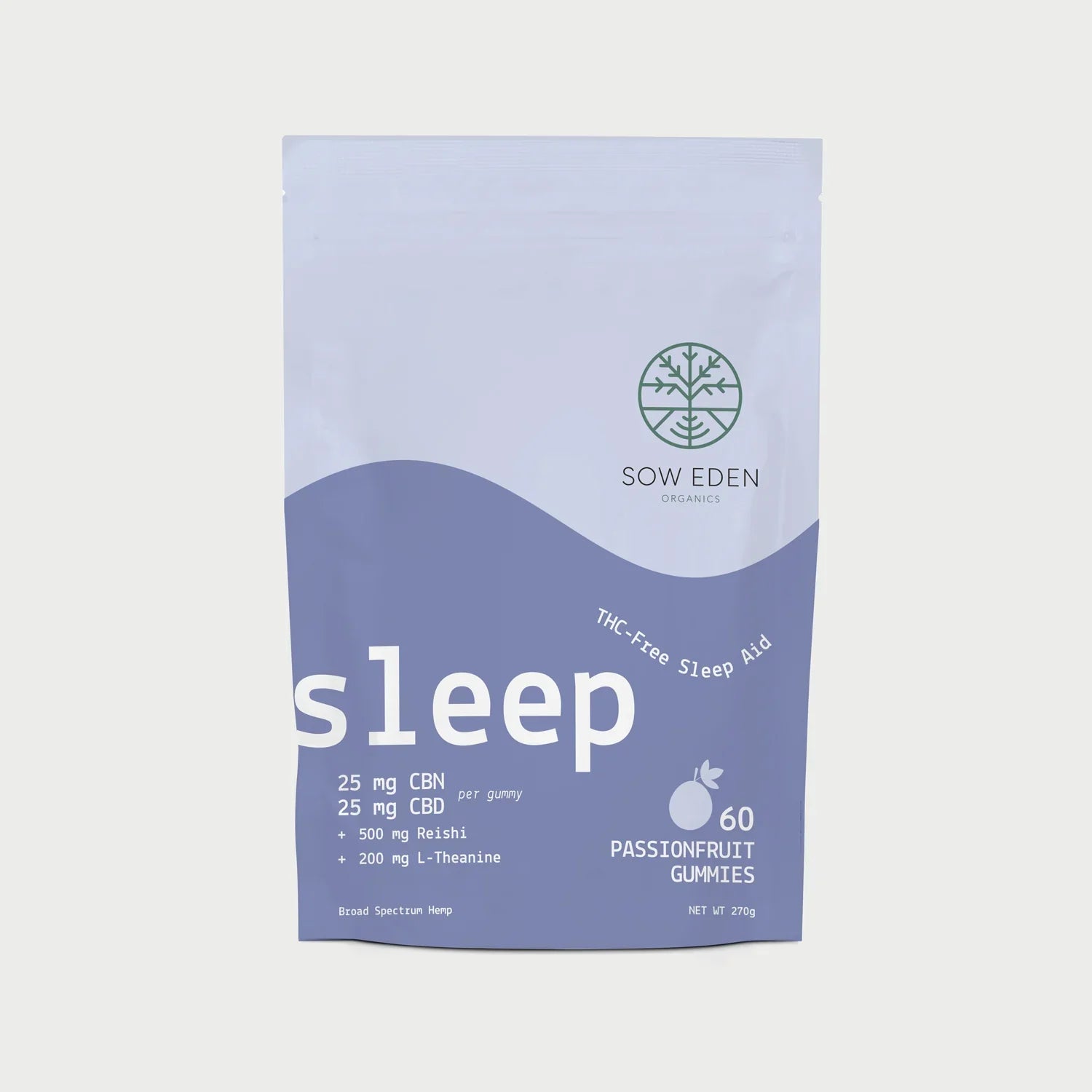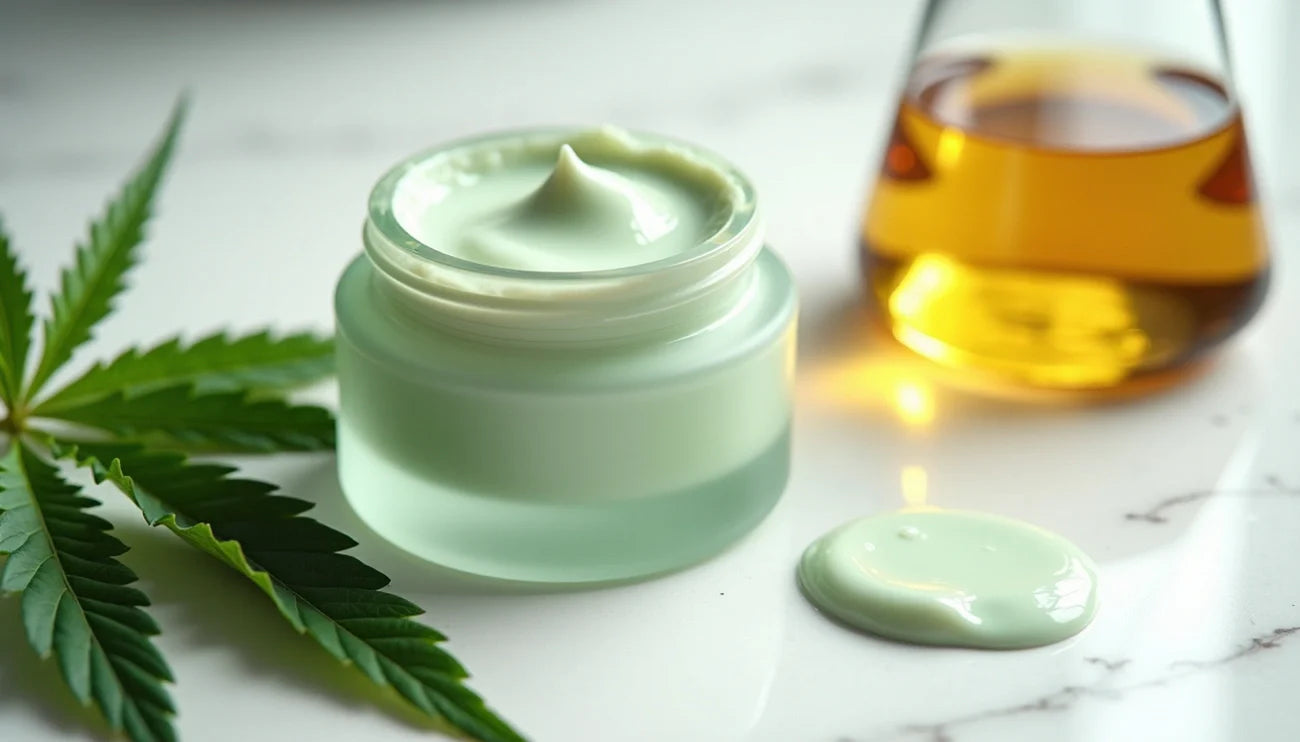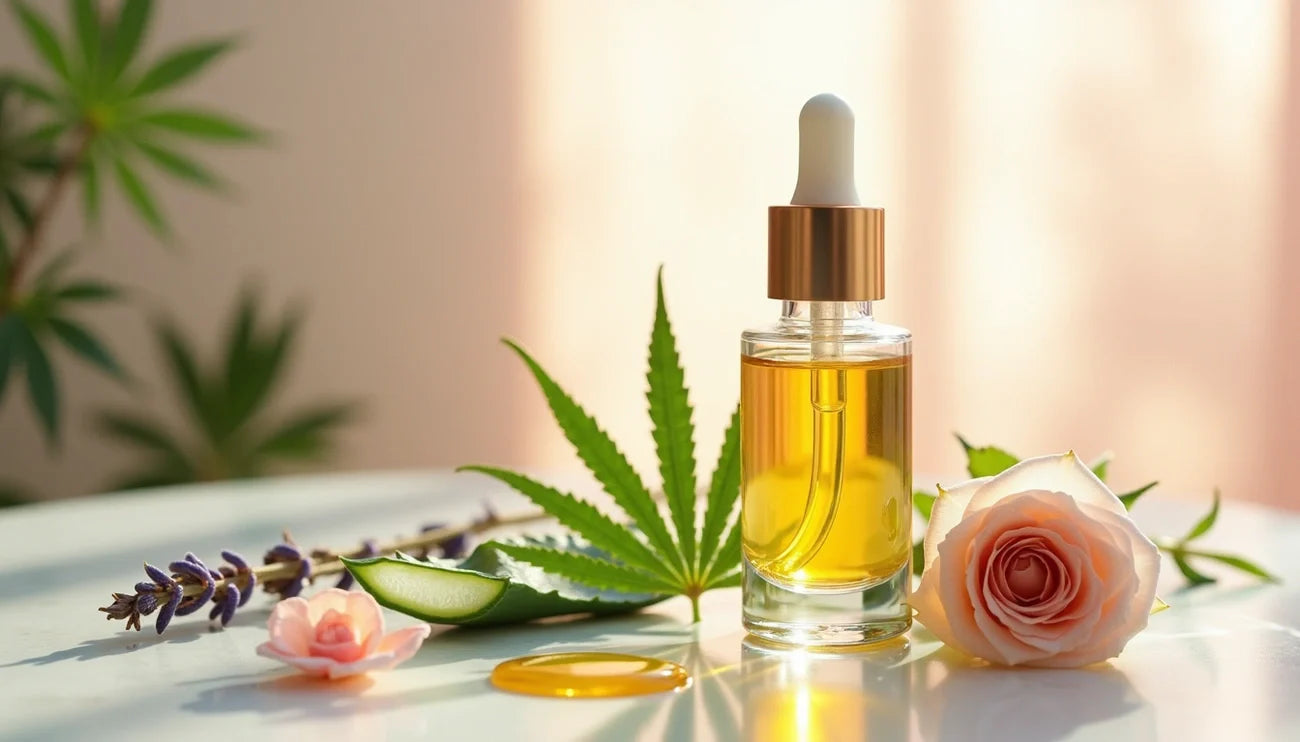Sleep problems affect many Americans - about 70% don't get their recommended hours of rest. CBD for sleep might help if you're spending nights tossing and turning in bed.
CBD products have become incredibly popular worldwide. The US and UK lead the market as the biggest CBD consumers. Research shows mixed results about cannabis and sleep. Yet some findings look promising. To name just one example, a study showed that taking 160mg of CBD daily helped healthy people sleep longer and wake up less during the night.
Finding the right CBD dosage to help you sleep better can be tricky because it works differently for each person. The quality of CBD products is different by a lot - a study of 84 online CBD products found that 26% had less CBD than stated on the label, while 43% had much more than advertised.
This piece will help you learn how CBD can lead to better sleep. You'll discover how to pick quality products and get practical tips to add CBD to your nighttime routine. This information will help you make smart choices about using CBD for sleep, whether you have occasional trouble falling asleep or want natural ways to sleep better.
Start by understanding your sleep challenges
You need to know what keeps you awake before trying any sleep solution. Finding the root cause of your sleep problems will help you choose the right approach that works for you.
Common causes of poor sleep
Poor sleep doesn't just make you tired - it can affect your overall health. Research links it to serious conditions like obesity, high blood pressure, heart disease, and diabetes. The first step to better sleep is understanding what disrupts your rest.
Sleep problems usually come from several sources:
-
Physical health issues: Sleep apnea, chronic pain, acid reflux, and conditions like Parkinson's disease can disrupt your sleep by a lot. Your sleep quality might also take a hit when you're sick or injured.
-
Mental health factors: About half the people with chronic insomnia also have anxiety or depression. Sleep and emotional health work both ways, often creating loops that make both worse.
-
Lifestyle influences: Your daily habits make a big difference in how well you sleep. Your rest suffers when you drink caffeine (even in the morning), alcohol, or eat big meals before bed. The same goes for irregular sleep times, poor sleep environments, and too much screen time - they mess with your body's natural sleep-wake cycle.
-
External stressors: Everyday stress from work, relationships, health worries, or money problems can keep your mind racing at night. Big changes in life - from short-term jet lag to moving homes - can throw off your sleep.
When to think about natural support like CBD
CBD might be worth looking into after you've worked on simple sleep habits and found what's causing your problems. Research shows CBD could help in specific cases:
CBD shows the most promise if anxiety or pain keeps you awake. Many people say CBD helps manage these issues, so their sleep gets better. Studies show that 80% of people using CBD for anxiety felt less anxious within a month, and more than 65% slept better at first.
CBD might also help if stress or racing thoughts keep you up at night. Early research suggests CBD could calm your nervous system and might help with anxiety-related disorders that mess with sleep. While we need more evidence, some early studies show CBD might help you sleep by working with sleep-regulating receptors.
Talk to a healthcare professional before trying CBD, especially if you:
- Take other medications (CBD can change how your liver processes many drugs)
- Have health conditions
- Use sleep medications
Note that CBD research on sleep quality is still new, with mixed results so far. The FDA doesn't regulate most CBD products, so choosing the right one matters a lot.
Note: These statements have not been evaluated by the FDA. CBD products are not intended to diagnose, treat, cure, or prevent any disease.
How CBD may help with sleep
The science behind CBD's sleep benefits works through several mechanisms that scientists are still trying to get their arms around. Let's get into what current evidence tells us about how CBD might help people sleep better.
CBD's potential calming properties
CBD seems to calm down the central nervous system, which makes sleep researchers very interested. Studies show CBD works with several receptor sites including CB1, GABAa, 5-HT1A, and TRPV1 receptors. This multi-target approach might explain why it affects sleep regulation in different ways.
CBD's work with 5-HT1A receptors could be why it helps reduce anxiety. Research showed CBD helped lower anxiety in almost 80% of people within a month, and sleep got better in more than 65% of these people.
CBD's effects on sleep depend on how much you take. A study found that 160mg CBD helped healthy people sleep longer and wake up less during the night. But here's something interesting - smaller doses tend to wake people up while bigger doses make them sleepy.
Its connection to stress and rest
One of the most important ways CBD might help with sleep is how it affects stress hormones. Research shows CBD can lower cortisol levels by turning down the corticotropin-releasing hormone (CRH) gene. This matters because cortisol, known as the "stress hormone," usually keeps people awake.
On top of that, CBD might help fix other problems that mess with sleep. To cite an instance, CBD shows promise in helping with chronic pain, which often keeps people from sleeping well. By easing these root causes, CBD could help improve sleep quality indirectly.
People who can't sleep because of anxiety might find CBD especially helpful. Clinical studies show CBD can calm anxiety that keeps your mind racing at night. Many studies keep finding this link between less anxiety and better sleep.
What early research suggests
While research is still new, the first findings look promising. Studies show people taking CBD might feel better overall compared to those taking placebo, plus they feel more alert and balanced when they wake up.
The research suggests higher doses of CBD work better for insomnia. Clinical studies tried different amounts:
- 160mg helped people sleep longer
- 300-600mg made healthy adults sleepy
- People handled up to 1500mg daily just fine
Current evidence suggests CBD is pretty safe. People taking 10mg to 400mg daily didn't show any toxic effects. In spite of that, it doesn't work the same for everyone, and some studies found sleep improvements varied among different people.
A 2023 review looking at 34 studies about CBD for insomnia found that all but one of these studies reported some people's symptoms got better. But we still don't have much research comparing CBD to other sleep medications.
These statements have not been evaluated by the FDA. CBD products are not intended to diagnose, treat, cure, or prevent any disease.
Picking the best CBD product for your needs
You need to know your options to pick the right CBD product. CBD comes in many forms and formulations. The best choice for your sleep needs depends on a few basic factors.
Comparing oils, gummies, and capsules
CBD products come in several common forms. Each one helps with sleep differently:
CBD oils (tinctures) work the fastest. Place them under your tongue and they reach your bloodstream in just 10-15 minutes. They deliver more CBD per dose with 20-30% bioavailability. The effects last 4-6 hours. These oils work best if you have trouble falling asleep.
Gummies and edibles are different. They take 45-60 minutes to work because they go through your digestive system. But their effects last longer - 6-8 hours. This makes them great for staying asleep all night. You get the same dose each time, so there's no guesswork.
Capsules give you the best of both worlds. They're as easy to take as gummies but have fewer additives.
Start by identifying your main sleep issue - trouble falling asleep or staying asleep. Then pick what works for you based on taste, ease of use, and privacy needs.
Looking for a premium solution? Try our premium CBD gummies with zero THC for sleep: https://www.soweden.com/pages/zero-thc-sleep-gummies-cbn-cbd-with-reishi-l-theanine
How to read CBD labels
Quality CBD products have clear labels. Here's what you should look for:
CBD content: Check both total CBD (like 1000mg) and per-serving amount (like 33mg per dropper). This shows strength and helps you dose correctly.
Type of CBD extract: The label must show if it's full-spectrum, broad-spectrum, or CBD isolate.
Third-party testing: Good products come with Certificates of Analysis (COA) from independent labs. These show exact cannabinoid levels and check for contaminants. Research shows only 31% of CBD products have accurate labels. About 43% have more CBD than claimed and 26% have less.
Ingredient list: Look at the carrier oil used (MCT, hempseed, etc.) and other ingredients. Products with fewer ingredients usually mean fewer possible interactions.
Choosing between full-spectrum and isolate
Your choice of CBD type makes a big difference:
Full-spectrum CBD has all hemp plant cannabinoids, including small amounts of THC (under 0.3%). These compounds work together creating an "entourage effect" that might boost benefits. A 2018 study suggests full-spectrum CBD works better for pain than isolate.
CBD isolate gives you 99% pure cannabidiol without other compounds. It has no smell, no taste, and zero THC. This works well if you worry about drug tests or THC sensitivity.
Broad-spectrum sits in the middle. It has multiple cannabinoids but no THC.
Full-spectrum often leads to better, uninterrupted sleep because of the entourage effect. But CBD isolate might work better if you're just starting out or sensitive to THC. It gives you a cleaner experience with more predictable results.
These statements have not been evaluated by the FDA. CBD products are not intended to diagnose, treat, cure, or prevent any disease.
Using CBD the right way at bedtime
Your CBD product needs the right usage approach to give you the best results. The right timing, dose, and regular use make all the difference in how well it works for you.
Ideal timing for different sleep issues
Research shows that CBD works best when you take it 30-60 minutes before bedtime. This gives your body enough time to process the compound as you get ready for sleep. The pre-bed window becomes vital if you have trouble falling asleep.
You might want to take CBD after dinner if you keep waking up during the night. This creates a gentle calming effect as your evening progresses.
CBD works great when you make it part of your bedtime habits—during a warm bath, while reading, or after brushing your teeth. Your body starts to recognize these moments as signals to wind down.
Looking for quality sleep support? Check out our premium CBD gummies with zero THC for sleep: https://www.soweden.com/pages/zero-thc-sleep-gummies-cbn-cbd-with-reishi-l-theanine
How to find your cbd dosage for sleep
The right CBD dose varies from person to person based on their body weight, metabolism, and sleep issues. Here's what you need to know about dosage:
- Start with 10-25mg each night
- Keep a sleep journal to track how well it works
- Make small adjustments—up or down—based on how you feel
Some people might need more than 100mg to see results. Studies have shown good sleep outcomes with different amounts—ranging from 25mg daily to 150mg depending on the person.
Why consistency matters
Daily CBD use at the same time works better than taking it now and then. This helps CBD build up in your system and keep steady levels.
A study found that 66.7% of patients slept better after a month of regular CBD use. Your body learns to associate these signals with sleep time when you take it regularly.
It's worth mentioning that benefits don't always show up right away. Most people see their sleep quality get better over several weeks of regular use.
Smart tips for safe and mindful use
Safety is a vital priority to consider when adding CBD to your sleep routine. A few basic guidelines will help you get the benefits without side effects.
Checking for third-party testing
CBD products must undergo independent laboratory testing. These tests verify the product's CBD content and check for contaminants like heavy metals, pesticides, and biological impurities. Each product should include a Certificate of Analysis (COA) that confirms the contents match the label. Research shows many CBD products contain different amounts than advertised, which makes this verification significant.
Understanding possible interactions
Your body processes medications through liver enzymes, and CBD can affect this process for over half of all prescription drugs. Medications with a "grapefruit warning" may interact with CBD. Be careful with:
- Blood thinners
- Anti-epileptic drugs
- Antidepressants
- Opioid analgesics
- Some statins
CBD combined with antihistamines, benzodiazepines, or alcohol might make you more drowsy.
Pairing CBD with healthy sleep habits
The best results come from combining CBD with proven sleep practices:
- Maintain a regular sleep schedule
- Create a comfortable sleep environment
- Limit screen time before bed
A healthcare professional familiar with cannabinoids should guide your CBD use, especially when you have other medications.
Final Thoughts
CBD provides a natural solution to help you sleep better. This piece explores how CBD helps you rest better by working with your nervous system. It can lower stress hormones and tackle common sleep disruptors like anxiety or physical discomfort.
Your experience largely depends on choosing the right CBD product. CBD oils act quickly but don't last as long, which makes them ideal to fall asleep fast. CBD gummies and capsules last longer and might help you sleep through the night. Your sleep patterns should guide what you choose.
Proper dosage is different for each person. The best approach starts with a small amount (10-25mg) that you can adjust based on how your body responds. CBD works best when you keep taking them at the same time each night. This helps your body build a steady response.
CBD delivers better results when paired with good sleep habits. A regular sleep schedule and a cozy bedroom boost CBD's benefits. Cutting back on screens before bed also helps. These habits create perfect conditions for quality sleep.
Make sure to ask your doctor before adding CBD to your daily routine, especially with other medications. CBD might interact with certain drugs because it affects the liver enzymes that break down prescriptions.
Note that CBD affects everyone differently. Something that works great for one person might need tweaking for another. Taking time to find what works best equips you to achieve better sleep.
These statements have not been evaluated by the FDA. CBD products are not intended to diagnose, treat, cure, or prevent any disease.




